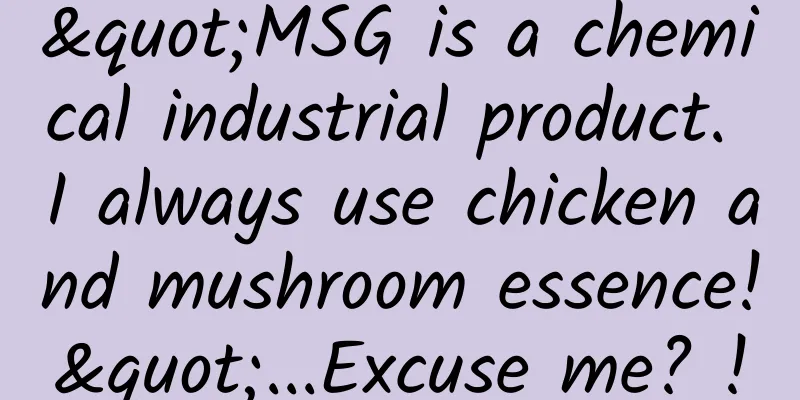"MSG is a chemical industrial product. I always use chicken and mushroom essence!"...Excuse me? !

|
"I heard that eating too much MSG is not good for you, so our family doesn't eat MSG anymore. We only use chicken and mushroom essence when cooking!" MSG has many harmful effects in urban legends, and these "harms" are different in different versions of the legends. Many people "believe" that MSG is harmful. In addition to these urban legends, an important reason is that they think it is a "chemical industrial product." - But this is not the case. Image | Pixabay What is MSG? Among the basic tastes that the human body can experience, there is one called "umami". Asians have long used various thick soups as seasonings to increase the "umami" of food, such as chicken soup, bone soup, kelp soup, etc. In 1907, the Japanese evaporated a large amount of kelp soup to obtain monosodium glutamate, and found that this thing tasted like the umami in many foods. This thing is what we call MSG. The original MSG was obtained by hydrolyzing protein and then purifying it. Modern industrial production uses a certain type of bacteria that is good at secreting glutamate to ferment it. The raw materials for fermentation can be starch, beets, sugar cane, and even waste molasses, which greatly reduces the production cost. This process is similar to the production of wine, vinegar, and soy sauce. No "chemical raw materials" are used in the production process. If wine, vinegar, and soy sauce are considered "natural products", then MSG should also be a natural product. If it is considered a "chemical product" because fermentation and purification are industrial processes, then at least liquor should also be classified as a "chemical product." Baijiu...Are you sure? | Pixabay Glutamic acid is one of the 20 amino acids that make up protein and is widely present in organisms. However, glutamate bound to protein will not affect the taste. Only free glutamate will be in the form of glutamate and produce a "umami" taste. Sodium glutamate exists naturally in foods containing hydrolyzed protein. For example, soy sauce is obtained by hydrolyzing protein, and the content of sodium glutamate is about 1%, while cheese is even higher. Some hydrolyzed proteins, such as hydrolyzed protein powder or yeast extract, contain sodium glutamate content of up to 5%. There are also some vegetables and fruits that naturally contain sodium glutamate, such as grape juice, tomato sauce, and peas, which all contain a few tenths of a percent of sodium glutamate. This concentration is much higher than the minimum concentration required to produce "umami"! The MSG on the market today is a highly purified fermentation product. my country's national standards require that the sodium glutamate content be at least 80%, while high-purity MSG requires more than 99%. MSG and the “Chinese Restaurant Complication” In 1968, an article was published in the New England Journal of Medicine, describing a strange experience of eating Chinese food. It said that 15 to 20 minutes after starting to eat Chinese food, the back of the neck began to feel numb, and then began to spread to the arms and back, which usually lasted for about two hours. This article triggered a worldwide panic about MSG, which was called "Chinese restaurant complications". Later, some studies on "Chinese restaurant complications" were conducted, but they could not confirm its existence. However, based on the unwarranted skepticism of "unconfirmed does not mean non-existent", this story quickly spread widely, but no one paid attention to the research on it. Safety of MSG There have been many studies on the safety of MSG, and none have been found to cause harm. Only a few animal experiments have found that at "large doses", it may cause neurotoxicity in very sensitive mice. However, the large doses required are far higher than the amount that may be used in human food, and there have been no further follow-up studies. The US FDA, the American Medical Association, the Joint Expert Group on Food Additives (JECFA) of the Food and Agriculture Organization of the United Nations and the World Health Organization, and the European Commission's Food Scientific Committee (EFSA) have all conducted evaluations and reviews. Both JECFA and EFSA believe that there is no safety concern about MSG, so its use in food is "unrestricted." A report from the US FDA acknowledges that "an unknown proportion of the population may react to MSG," but they agree with JECFA's conclusions on MSG as a whole. Chicken essence or other essence So what? The name "Chicken Essence" is very successful, and the picture of a big hen on the package gives people the impression that chicken essence is the "essence of chicken". The sales of chicken essence are also likely to replace monosodium glutamate. What’s the truth? The main ingredient of chicken stock is still MSG, but MSG is a single sodium glutamate, while chicken stock is a compound seasoning, in which the sodium glutamate content is about 40%. In addition to MSG, chicken stock also contains starch (to form granules), flavor nucleotides (to increase the taste of MSG), sugar, and other spices. Flavor nucleotides themselves can also produce umami. After mixing with MSG, the resulting umami will greatly exceed the sum of the umami of the two alone. This is the so-called "synergistic effect". Strictly speaking, chicken essence should contain some chicken ingredients, such as chicken powder, chicken fat, etc., to produce the taste of chicken. However, since chicken ingredients are relatively expensive, manufacturers may not use chicken ingredients at all in order to reduce costs. Therefore, whether the chicken essence you buy contains chicken ingredients depends entirely on the manufacturer, and it is basically impossible for consumers to judge from the product. Chicken essence advertisements often claim that they contain "real chicken", but when bird flu broke out, they changed their words and said that there was no chicken at all... →_→ | Pixabay MSG has a single ingredient and mainly adds "umami" to food. Compound seasonings such as chicken essence and mushroom essence have complex ingredients and generally have a stronger "fragrant" flavor. No matter what kind of essence it is, as long as it can produce "umami", it contains MSG - sodium glutamate. It's just that after careful formulation, compound flavors are more efficient in producing umami and can also meet different specific needs. in conclusion The chemical component of MSG is sodium glutamate, which is a type of glutamate that can produce "umami taste". In addition to MSG produced by fermentation, glutamate is also widely present in various foods. Scientists have tried for a long time to confirm the rumor that "MSG can cause XX", but they cannot confirm it. In the international authoritative organization JECFA and the regulatory systems of the United States and the European Union, the safety of MSG does not need to be considered, and its use in food is not restricted. Meat flavorings such as chicken essence also contain a lot of MSG. An AI Since MSG is so safe, I decided to skip the “not too much” routines - as long as you don’t mind it, you can add as much as you like. As for those who advise you to replace the “unhealthy” MSG with chicken and mushroom essence - you can choose to eat it if you like! This article comes from Guokr and may not be reproduced without permission. If necessary, please contact [email protected] |
>>: Gynecological master or devil from hell? The Dr. Sims you don’t know!
Recommend
Video Network Promotion Methodology
According to iResearch mUserTracker data, in 2016...
Which cancers are related to “eating”?
Pay attention, pay attention! The following 8 typ...
"White Paper on Large-screen Marketing in the Pharmaceutical and Healthcare Industry" is released, Huanwang helps pharmaceutical brands return to the main marketing position
The pharmaceutical and healthcare industry is clo...
What are the methods of QQ marketing? What are the marketing and promotion methods using Tencent QQ?
Today we are living in the Internet age, and we c...
Why does your app have no users? Because the IQ of ordinary people is "too low" to learn...
Bump is an amazing cross-platform data transfer a...
Always waking up at 3 or 4 in the morning? It may be related to these 5 major diseases →
Today, we are going to talk about a problem that ...
To do operations, you need to understand these "unspoken rules"!
In the eyes of marketers , this business world is ...
As the app dividend fades, will female players support the second half of Internet traffic?
Although Liang Yongan, associate professor of the...
How to read the KDJ line "KDJ indicator technical tactics" KDJ indicator usage skills detailed video tutorial
Training course video content introduction: The K...
Problem record: Stripping of iOS user behavior statistics code
[[140437]] I have been working on a statistics mo...
The successor to the next generation iPhone design is "Cook behind Cook"
In the past 100 days, Apple has seen a number of ...
Ministry of Industry and Information Technology: Vigorously safeguard personal information security and achieve fundamental improvement in the consumption environment
Recently, the Ministry of Industry and Informatio...
You will know the high-quality Baidu promotion account structure after reading this article...
Baidu search keyword bidding is a very common pro...
There are really no new features to add, so Android 12 has to add a "Recycle Bin" feature
The mobile phone operating system has developed t...
Tesla, Dyson and others have all lost to ventilators abroad, and the price of ventilators in the domestic market has skyrocketed
According to foreign media reports, last month Te...



![[Grain Policy of a Great Country] My Chinese Core | Wang Kejian: Solving the century-old problem of hybrid rice being unable to save seeds](/upload/images/67f1ca93b5e01.webp)





